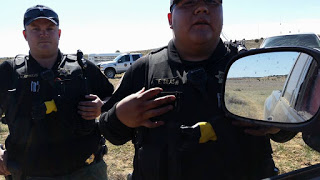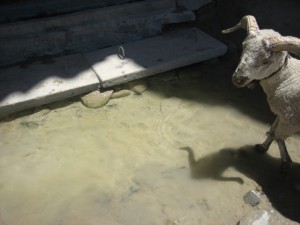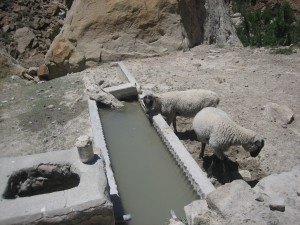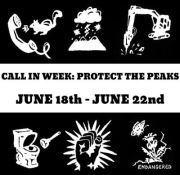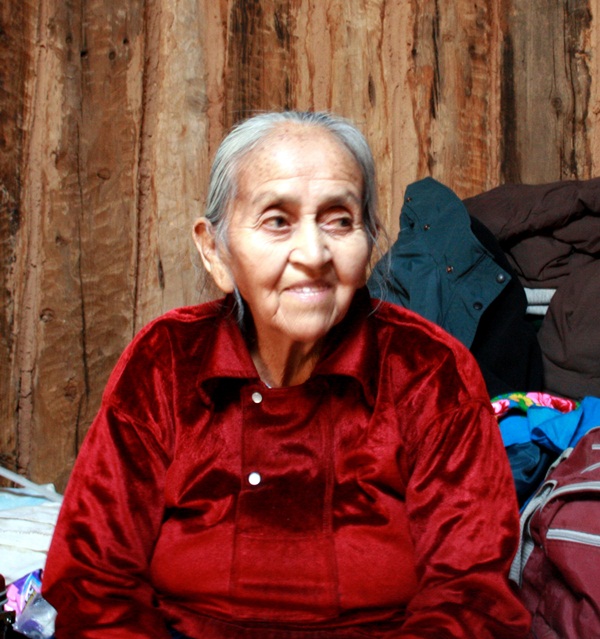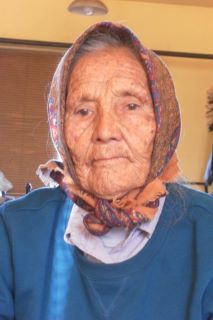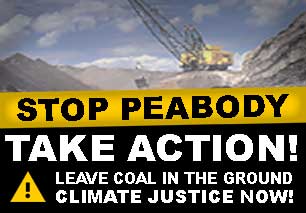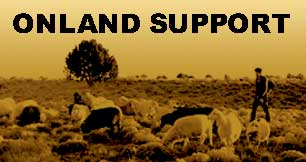“Big Mountain is Under Siege Again”–Louise Benally on Livestock Impoundments
“We are asking you to take action. Big Mountain is under siege again because Peabody Coal is losing its income from coal mining, so it is pressuring the tribal government to attack its own people. We’ve been opposed to the mining since 1974 when PL 93-531 was passed. Now with the coal companies collapsing they are trying to take the only resource we have, which is our animals to eat and sell.
They are stealing our livelihood away and holding them in pens and charging us a lot of money and refusing to bring them back to people’s homes. When the animals are taken away, people can’t return to their homes.
They are holding the animals as ransom, but we don’t have money because we don’t have a cash economy. There is no work except for the coal mine. We need human rights and justice for the environment. This is a fight for human rights — Animals are food. When they take our food what choice to we have? We are calling out to the world to help us apply public pressure. Demand animals be returned to owners and that the owners are allowed to decide how to manage the land and animals.
Call the Department of the Interior, the Department of Justice, and the Navajo Nation. The Navajo Nation refuses to help the people who are resisting relocation openly. No one is backing us up because we are resisters. This has always been stacked against us.
They are harassing and terrorizing people and when they take their animals away they can never come back to the land. They tell us we are illegally living here. We are illegal aliens basically. But I am older than PL 93-531. I was born in 1960 and that law didn’t come along until 1974. That’s why I don’t recognize it. I was here before.”—Louise Benally, Dineh, Big Mountain LouiseBenally6@gmail.com
Numbers to Call:
BIA superintendent Wendel Honanie at( 928-738-2228),
Hopi Rangers Clayton Honyumptewa at (928-734-3601),
Navajo Nation President Russell Begaye: (928) 871-6352/6353
Department of Interior at (602-379-6600)
You can donate to a livestock impoundment fund HERE. Please specify “Black Mesa Impoundements” in the designation box.
If you can come out to the land and act as a human rights observer in the face of this increased community harassment, contact blackmesais@gmail.com
Hardrock Chapter House requesting photographs of Big Mountain/Black Mesa Resisters
The Hardrock Chapter House is requesting photographs of Big Mountain/Black Mesa resisters the honor the struggle at the dedication of their new building next Friday (Aug. 3rd). They would like to either borrow the photos or leave them in the new building for permanent display.
Please contact Mary Robertson-Begay if you have questions at (928) 725-3501, or email her photos at: mbegay523@yahoo.com
Many thanks!
Big Mountain/Black Mesa Voices Speak Out Against the Water Settlement
“What the settlement is trying to do is remove our ability to protect our own source of water. That’s the gist of it. We will have no recourse,” Nicole Horseherder, Black Mesa resident, put it in a recent Indian Country Today article.*
Water for Coal
Since 1974, Peabody Energy and the U.S government have made grand promises to the people of Black Mesa/Big Mountain in order to access the second largest deposit of coal in North America. Equally desirable were the aquifers and rivers used to provide water to desert cities and to slurry coal from Black Mesa to generating stations.
Big Mountain/Black Mesa Relocation resister and matriarch Katherine Smith explained: “On Black Mesa, the earth is getting dry and open, the washes are dry; too much water is going down to California and Phoenix.”
In years of research, most recently in their appeals against the 2011 Kayenta Mine Permit renewal, activists from Big Mountain and Black Mesa have turned up scores of evidence about the severe damage the mine has done to the quality of the water in the N-Aquifer. “The N-aquifer is the groundwater source on which Black Mesa residents depend. It’s also the aquifer from which Peabody Coal [sic] has pumped millions upon millions of gallons of water to transport coal in a pipeline from Black Mesa to the Navajo Generating Station [NGS] in Nevada.”[1]
Activists express deep concern over the parts of the Water Settlement that require the Navajo Nation to renew its lease with NGS until 2044 and the clauses that prohibit any lawsuits against the parties that have caused past or will cause future damage. The renewal of NGS’s lease would effectively keep Peabody’s mining operation functional during that time.
Horseherder said: “the people who have to shoulder the cons [of the settlement] are people of Black Mesa again. It’s coal that’s dug from Black Mesa to provide the power that’s needed to deliver Phoenix and Vegas’ water supply. Once more, we’re giving a corporation another break for free. Basically, they’re being told there’s already evidence to the damage that’s occurred – but they’re off the hook.”
Relocation Redux
Leonard Benally, one of several hundred steadfast Big Mountain relocation resisters, said, “This new bill S.2109 reminds me a lot of PL 93-531, the Relocation Law. We lost our land rights with PL 93-531, we cannot lose our water rights with S.2109. We need to be able to control and use our own water.”
Through corporate and political maneuvering and the fabrication of a land dispute, PL 93-531, the Relocation Law, divided the former Joint Use Area (JUA) of the Hopi and Navajo lands into the Hopi Partitioned Lands (HPL) and Navajo Partitioned Lands (NPL). The forced relocation of about 14,000 Navajos and about 300 Hopis[2] was a part of the process through which Peabody Energy accessed surface rights to the HPL, as well as the millions of gallons of water needed to process and slurry coal.
Dineh activist and scholar John Redhouse notes: “the United States of America has repeatedly violated the human rights and territorial integrity of the Navajo and Hopi people living on Black Mesa and throughout the former JUA (now the HPL)…by robbing the two tribes of their sovereign status and dispossessing them of their aboriginal land base…The bottom line in every major Indian removal program has been white control of land and resources.”
PL 93-531 prohibits Dineh residents of the HPL from maintaining springs and wells, building infrastructure like dams, and accessing new water sources.[3] It has restricted infrastructure development to roads, houses, wells electricity and running water. Many Dineh residents of the HPL travel between 40 and 80 miles round-trip on undeveloped roads to get water for themselves and their livestock. Therefore, as springs dry up and the water table drops because of mining water use, drought, and climate change, HPL residents feel the impacts disproportionately.
Marie Gladue from Black Mesa/Big Mountain stated, “The water being negotiated is right under us on the HPL, but we have no right to it now and is not being addressed by our tribal government. We [HPL residents resisting relocation] have been left out of water deals for too long.”
Water is Life
In the same Indian Country Today article as mentioned above, Jason John, principal hydrologist with the Navajo Nation Water Resource Department, described the unique frustration felt by residents of the HPL: “They see this company that has eight or nine wells pumping thousands of gallons every day for an industrial operation, and here they are having to haul water for their daily lives.”
Nicole Horseherder understands this threat that a lack of accessible, clean water poses to traditional lifeways on Black Mesa thusly: “They [traditional elders and residents of Black Mesa/Big Mountain] understand the connection between the environment and their ability to sustain what they’re doing today. If the water cycle is out of balance as it is now, they know the thing that’s going to be affected first and foremost is their livelihood…What we’ve been relying on all these years are free-flowing natural springs, natural seeps and places where … the water will come right out of a break in the face of the rock,” she said to reporter Anne Minard. She added that generations of people have built cisterns to collect spring water, and cleaned out areas around springs so pools can form.
“People would carry their jugs to these places,” Horseherder said. “Springs dotted Black Mesa like you wouldn’t believe. People have known since the beginning of time living here which springs produce the best water.” But all over Black Mesa, people have been noticing springs that don’t produce any more. “The elders will say, ‘10 years ago was the last time I saw water there.’”
Louise Benally, a relocation resister from Big Mountain, expressed, “If the Navajo tribal government isn’t for the people’s water rights and self determination, then we need tribal governance that listens to the voices of the people. What could be more important for our people than water?”
Another Big Mountain community member said, “This deal doesn’t just affect the Hopi and Navajo Nation. It affects all Native American tribes and it damages the Earth’s ecology. We as a people believe that water is sacred. Let’s act on it.”
Thanks to many generous donations, Black Mesa Indigenous Support (BMIS) is collaborating with the Black Mesa Water Coalition (BMWC) to help get Big Mountain and Black Mesa community members to Window Rock for the vote this Friday, June 22nd. We would like to express our gratitude for the interviews and the opportunity to support this community mobilization.
Liza, Hallie, Derek, & Berkley, with the BMIS collective
- A link to S.2109, the settlement & summaries: http://bit.ly/I8g7pr.
- A link to the Navajo Nation Human Rights Commission’s Article on the Water Settlement and UNDRIP: http://www.navajo-nsn.gov/News%20Releases/NNHRC/2012/Apr12/4412_NNHRCEncouragesPublicParticipationAtForumsAddressingSB2109.pdf
- A link to background information on the settlement: http://www.ourwaterrights.org/
- Also check out this article that explains and refutes the Kyl’s use of a picture of a horse and wagon on the Navajo Reservation to describe how Navajos aren’t transporting water safely and aren’t “using” it properly. Ironically, the picture he’s referring to is of a resident on the HPL, who described how the horse and wagon actually belong to a local roving vet—a Midwesterner of European descent.
*The words “Dineh” and “Navajo” are used interchangeably in this article.
*This article uses the geographic terms “Black Mesa” and “Big Mountain” to describe the areas of the Hopi Partitioned Lands that are close to Peabody’s mines where the Dineh relocation resistance communities are most concentrated.
*Some of the framing as well as the quote from Jason John and all quotes from Nicole Horseherder in this article were originally published in the Indian Country Today article, “Black Mesa Shouldering the Burden of the Navajo-Hopi Water Project”, by Anne Minard (May 27, 2012). They are reprinted here with permission from the author.
*All other quotes from Black Mesa residents are from personal interviews with the Black Mesa Indigenous Support collective and are used with the speaker’s permission.
*Photos by Liza Minno Bloom
Endnotes
TAKE ACTION: Call-In! Cause we ain’t gonna Give-in!(Below is a short/simple guide to help you get started. Please feel free to state those facts/points that you feel are most important to you. If you would like more talking points, please visit www.ProtectThePeaks.org)Hello, my name is ___________ and I am a resident of ____________.
I am calling to ask that your company immediately halt all construction on the (sacred) San Francisco Peaks and withdraw your contract with Snowbowl.(Company name here) is committing gross Human Rights violations against diverse communities of Flagstaff and surrounding areas. Your participation in the expansion of Snowbowl Ski Resort threatens the very health and safety of our communities, the environment, the homes of endangered species and our water security.To the 13 Indigenous Nations that hold this mountain sacred, you are an accomplice in cultural genocide.
To the children who will accidentally eat the snow, you are risking their health and their lives.
And to the fragile alpine ecosystem already under duress, you are committing irreparable harm and death.
You are not absolved of your responsibility. Immediately halt all construction and withdraw your contract with Snowbowl! As long as your involvement continues, we are committed to protecting our communities.————————————- Contact the following companies! ———————————–Towsley Welding & Construction
1 (800) 552-5177 (office)
(909) 866-0600 (shop)
snomaking@aol.com
Fax: (909) 585.7902High Desert Investment Company
(928) 774-9111
Fax: (928) 774-9113
hdico1@qwestoffice.netRSC (Parent Company is Stronger United)
(928) 526.2823
Fax: (928) 526-6815
We call on people across the country to join this action and shut down the corporations!: Louise Benally’s statements on #F29
Note: On December 2, 2011, Indigenous Elders & Supporters Occupy ALEC Member Salt River Project (SRP) Headquarters. Louise Benally, a resident of Black Mesa impacted by SRP’s operations, delivered a letter to SRP that outlines critical concerns of her community. She expressed that “My community is heavily impacted by Salt River Project’s coal and water extraction activities. SRP has extensive ties to Peabody Energy’s massive mining operations and the Navajo Generating Station which they co-own.
“…We demand that SRP & Peabody meaningfully involve the indigenous communities they are impacting, and that they convert to non-fossil fuel based energy sources and address the health impacts on our communities.”
“…ALEC, acting in the corporate interests of SRP & Peabody Energy, continues policies & operations that are not only devastating whole communities and ecosystems, but greatly de-stabilizing our planet’s climate for the profit of a few, the so-called 1%.” stated Benally.
Louise Benally made these statements today on the National Shut Down the Corporations Day #F29:
“Senator John Kyl passed the Northeastern Arizona water settlement act and previously was the attorney for SRP. He developed legistation to undermine the sovereign Navajo Nation tribal government. There is a clear conflict of interest here. The water settlement needs to be recalled. Additionally, the Navajo Generating Station (NGS) permits should not be attached to the Northeastern Arizona water settlement Act.
One issue is about energy and the other is about water; they should not be connected.
The EPA decision to allow the Navajo Generating Station to continue operating allows air quality to be undermined.
It’s unacceptable for the NGS to be exempt from federal air quality control. Therefore, SRP undermines the EPA. On top of it all, The Central Arizona program is stealing water.
Politicians are being bought off by energy companies and are being bought off by energy companies and undermining the EPA and stealing the NN’s water.”
Take this message to the streets to protest ALEC across the country!
Declaration of Rena Babbitt Lane and Zena Lane
Declaration of Zena Lane
P.O. Box 539
Tonalea, AZ 86044
(928) 660-9588
2/11/2012
I, Zena Lane declare the following: I was born and lived on top of Black Mesa all my life. Rena Babbitt Lane is my mother. Our family goes back generations and generations.
A Lady Hopi Ranger came to our home on Tuesday, 2/6/2011 at 9:00 AM. She stood outside the doorway. She said “I am checking around and want to see how you guys are doing.” We did not notice she was looking for the animals. Then she left and saw my brother Jerry herding sheep. She told Jerry “You are on the wrong side of the fence and said there, are a lot of sheep you guys have. She said she was checking around for wild horses and all our animals.” Then Jerry called me and said “The Lady Hopi Ranger is looking around.” Then I went with my mother to check our cows and when we were going down the road she met us again and said “You guys have a lot of sheep and need to reduce them down.” She said, “Everything on the permit will stay and if there is overgrazing we are going to pick up everything over the permit.” She said, “I will impound them and we are not going to tell you when this will happen. We are not going to give you any notice.” I asked her why they won’t tell us just like a thief. She said “We will not tell you. We are going to work by Hopi law and all animals not on the permit are trespassing.”
Declaration of Pauline Whitesinger 2/10/2012
Declaration of Pauline Whitesinger
P.O. Box 973
Hotevilla, AZ 86030
Message phone c/o Bonnie Whitesinger: (928) 283-6765
To: BMIS, Support Groups, Friends,
2/10/2012
I, Pauline Whitesinger hereby declare the following by and through Bonnie Whitesinger, my daughter and interpreter: I was born and raised in Big Mountain. I can trace my family back 8 generations before Fort Sumner. The orange pottery shards, cave markings are an example of how long we dwelled in and caretake our ancestral land without destroying it. We caretake our land with prayers and ceremonies. We can’t do that anymore because we need to get a Hopi permit to conduct a ceremony. And we are being told not to have any supporters so the US government funded Hopi area BIA rangers can spend federal money to conduct a siege against us and our survival.
I am a relocation resister and non-signer of the Accommodation Agreement, 75 year lease because I will not accept living under Hopi jurisdiction, a government I cannot vote in and have no representation.
I hereby declare the following: On January 26, 2012, a lady sheep herder from Mae Tso’s family drove to my residence in the morning to tell me that my cows were being confiscated at the Hopi rage Unit 259 windmill. I just returned home from a relative’s funeral, my niece’s eldest son in Sanders, New Lands when I heard this. I went with my son Phillip Whitesinger and we met lady Hopi Ranger at the windmill. When we saw her, I asked her why my cows are being taken without my knowledge. I told the Hopi lady that I did not get adequate notice and I was not properly notified. The Hopi lady told me, we know where you live and we know that you are staying home but we do not have to tell you. We can just take your animals illegally in Range unit 259. I told the Hopi lady they must have crossed this cattleguard that is filled in because they are not maintained and they are thirsty, looking for water.
I asked the Hopi lady how come you couldn’t just drive to my house and tell me if you know I am home. Instead, you are going behind my back to confiscate my animals. I asked the Hopi lady for her papers and she told me since I am a non-signer she didn’t have to give me any paper and I have no rights. She said, there are Hopi laws and ordinances and regulations that we are working with and I don’t have to give you any papers.
To get my animals out of the impoundment yard, I raised money from supporters to pay for their release. I went to get them back from Hopi area BIA on Friday, January 27, 2012 but they told me I needed statements from 3 non-family members to identify the markings of my 4 unbranded cows. I returned with the statements in hand on Monday, January 30, 2012. I was charged $418.00 to get back my 4 unbranded cows. I did not pay for the branded cow because they did not give me any notice of intent to impound.
It is hard when my animals are confiscated. I do not have much time to get them back or they sell them at public auction in 10 days and put the money into the Hopi Tribe’s general account. I was afraid the BIA would sell my cows before I could get them out like the 30 horses they took from Mae Tso, identifying buyers before they went out to confiscate them. By the time Mae Tso learned her horses were impounded they were already sold.
My cows were just looking for water at a windmill I was fenced off from under the 1974 relocation law. It is a few feet inside a fence line dividing HPL grazing units. I am denied access to water at a windmill I helped build. When I was 8 years old I was a petitioner for a windmill project and I put my thumb print on documents to allow a windmill to be set up. I have no other source of water.
I am thirsty and my animals are thirsty. Every little creature, birds, creatures that crawl, even the insects are thirsty that seek refuge in the Black Mesa area
I am being told I cannot have Anglo supporters. At the incident at the windmill, the lady Hopi Ranger told me and my son Phillip that we can’t have white people at my sheep camp and they will take me to court if they want for having Anglo helpers. The Hopi Tribe and the BIA don’t want their actions to be observe. This is elder abuse, a barbaric ideology.
HPL non-signers need horse people with trucks that can ride horses, help round them up and brand them, put ear tags on the cows. We need supporters at the sheep camp to protect the elders and help. It is lambing season and the lambs are heavy for them. We need assistance with hay runs, 4-way feed and the sheep dogs need dog food with the relief effort. We need food boxes for the elderly because they need special nourishment to sustain their traditional lifestyle. We need relief for fresh drinking water for people and livestock.
Our human rights and the human rights are being violated and stepped on. We are elderly, traditional people that are victims of relocation and a lawless BIA tyranny. Our sheep and our water is our life. Please help us!
Further declarant sayeth not.
By: Pauline Whitesinger 2/10/2012
Translated by: Bonnie Whitesinger 2/10/2012
Transcribed by: Marsha Monestersky 2/10/2012
Jack Woody Interview July 2, 2011—Red Willow Springs
Jack Woody Interview July 2, 2011—Red Willow Springs
Translation/Interpretation from Dineh: Bahe Katenay
Transcription: Liza Minno Bloom
What is your purpose [loose translation] staying here on Black Mesa alone and in your old age?
Jack: It began with my late wife. We met each other long ago. I grew up here riding horses all about. My wife and her family lived over the mountain and their animals didn’t have much grazing area—they’d just go to the wash and back. It was an arranged marriage. My mother-in-law said, “Now I expect you to be our helper. I raised my kids with no husband—we wandered—and now you’ll help.” I thought, okay; that’s how it will be. I knew a lot of open meadows behind the mountain. So we built a set of hogans and we moved through them over the years. We moved logs around from the original hogan like a monument. I got everyone in the family situated and took care of everyone.
When everyone was situated, I decided to make some money. There were three nearby schools that had their own little power plants. I got a job at a little underground coal mine, near Rena’s [Babbit Lane], that took power to the schools. I worked with Key Horse who became a medicine man. A wage job took me away from home. In the late 1950s, I began working for the railroad in California. I came home on the weekends to see my wife’s family. I provided for them while they took care of the animals.
We started with 20 Churro sheep and goats in the herd when we came together; we brought them over the mountain. I found a quarry and built a house of sandstone that was burned [doesn’t know by whom]. We had two cows. I traded work for more cows and then got some more from a dairy. The cow and sheep herds grew. We had a few horses too. We had almost 60 cattle when the whole land dispute began [1970s]. When the land dispute began, they reduced the herds to nothing. The younger generation didn’t work horses and the horses weren’t returned for two winters. Now that I am old, I can’t keep up with herds so big alone. The sheep that are left that I take care of are Key and his wife’s [In the matriarchal society, Jack’s wife owned the sheep, then they went to Key Watchman, her next of kin]. But I keep their life going.
I spend a lot of days by myself. It’s always in the back of my mind—to keep going what I promised to care for.
I see rangers and police drive by. They stop and look and mostly drive on. There was a life that I helped to start here.
What would you tell people about life here and how it has changed?
Jack: There was a lot of joy in the land in the past. Then, you knew you belonged here. You can still feel that love in the land. The coal company is way over there. Maybe this is the territory they want next.
Things have changed a lot. For years, people grazed their cattle, sheep, horses. For years there was plenty to eat and now everything is dry and dead and the ground is hard.
There were huge ceremonies for healing and dancing all year long. There was a lot of joy in the community. There used to be medicine men in every community and rituals all year long. The medicine men communed with the Spirit World. There were corn pollen offerings to plants and springs. Maybe that’s why it was always green and wet, why there was plenty to eat and it never looked over-grazed.
A lot of people here have turned to Christianity. It is a simpler way to pray. It is a simplified religion.
We have been noticed from the Spirit World. That’s who’s withholding the water and the green. The leaders of the resistance are gone, and now we don’t have direction. The Spirit World is aware of how we live today.
What I want people to know: you all have your lives out there. It’s good. But be willing to hear me and look at me and see how I am. I am alone. My children and grandchildren don’t visit.
The relocation situation is disappearing a whole word. You are now alone even when you’re with your kids and grandkids. Your family isn’t here anymore and you’re afraid to go see them because you wonder if they’ll reject you. You are afraid of your own family. I built new things for my kids and grandkids in Tuba City. It’s a lonely world, though, because everyone stares at the TV and you’re there but not there. There’s joy in that house and laughter, but in a different language and you wonder if they are laughing at you. So I prefer to be on the land. I feel better here.
As to why the younger generation isn’t on Black Mesa:
The answer is simple: schools. American education teaches the American-Anglo way—to follow the trail of white people. Now the younger generation only sees the trail of the white man. They don’t see the trail of the sheep or land or the grandmas and grandpas.
Caravan November 2010 Transcripts/Notes—translation from Dine by Danny Blackgoat
Caravan November 2010 Transcripts/Notes—translation from Dineh by Danny Blackgoat
Katherine Smith
“This is a 40-year, ongoing struggle with the empire of the West that allows places to spread out because of the resources here like coal and water. How do people understand the amount they consume in the desert—the golf courses, the swimming pools—it’s an illusion. It’s like a fairy tale, but at the sacrifice of what?”
“People give up their land and their community. They can’t improve their homes and have no access to power or water.”
Marie Gladue
*Water Settlement: “It’s a whacked out settlement; our hearts are broken by our leaders. You’re not supposed to say this in Navajo, but it feels like they’re putting us in a coffin. We see the decision about water as a way to continue the termination of our people.”
“There’s great satisfaction in learning that you are not the only one who exists in the world, to learn, for example, what the plants are telling you. The five-fingered are not the only ones in this environment.”
“The people living high off the hog have to be made to think. Use messaging—band together and buy a billboard in Phoenix. Tell them what’s going on; tell your people.”
“We’re not given the value of coal—it’s pennies. Same with water—they get $1,000 per acre/foot and only a few dollars come back here.”
“Phoenix is living off of our generosity, getting 34 acres of water a year for free. I don’t understand that. You know your own people. You know how things work in your world. You can support by making your own people conscious of the specific relationship between their lives and ours. “
“No one in their right mind would build a city in the desert with golf courses and swimming pools. We think about that paradox out here.”
“We stay here for our people.”
“There is always this idea that there is justice and fairness in the courts. It isn’t true.”
“The whole issue [relocation] has been such a can of worms that people want to just keep it closed.”
Suggestions: Just Transition, Begin with shutting down the Mojave Generating Station, “revalue what knowledge was in terms of crops and livestock.”
Mary Lou Blackrock
“We don’t have leaders who can help us. We hear a lot about leaders but we don’t see them until election time with their slogans. I went to Window Rock and they told me to go to Hopi, that it was their jurisdiction. The younger generation can’t establish homesites here on the HPL, so we’re left alone. I met Ben Shelly before the elections, during his campaign. I told him where I live, at the border of the HPL. He didn’t know where I lived or my condition. I told him to come and visit me in a blizzard.”
“Heard about the Navajo and Hopi joining forces….we are subjects. We are suffering.”
Pauline Whitesinger
“We don’t intermingle like in the old days. We’ve lost contact. I have forgotten some of the ladies here. My vision is failing. I make assumptions of who people are based on their voices. “
“I heard about the new Navajo president meeting with the Hopi president. They are getting cozy and making an agreement to remove the rest of the Navajo from the HPL. I am anguished by this news. Can we go to Window Rock and put a document forth to them? They will take the proceeds from the mine together, I suspect.”
“I must be going crazy. Things are in disharmony.”
Mae Tso
“Under Hopi we can only have a certain amount of sheep. They enforce it and they are always looking over our shoulder. They may extend this [impoundments] to twice a year, Spring and Fall.”
“The Navajo and Hopi leadership have come together to push more people off of the HPL…the final solution [that was Danny’s interpretation].”
“The Hopi Rangers have drained the aquifers. We need to keep the water on the reservation.”
Evelyn Simonson
“They are confiscating animals because they have plans for the mine.”
“The people who finished their education off the land went on to manage the mine. I might have too if I had finished my school, but I remembered Grandma’s teachings about the land.”
“Greed for money is affecting the climate. It is affecting our lives here. We want to live in harmony with the natural elements, but things are changing. The snow is changing. This winter I saw snow that was blue. It wasn’t normal or natural.”
“As a young woman I was told to be a caretaker of the land and I try, but I see it disrupted right before my eyes.”
“I always wondered when the day would come when the wind would stop on the surface of the earth and take all of us at once.”
Louise Benally
Suggestions: Plug into National organizations, connect Black Mesa mining to the national impact of Fossil Fuel use, get a community office (on HPL—rent from the mission), increase self-care efforts (like herbal clinics, etc.), more networking, more self-sufficiency, more education, get a radio stationed (licensed, not pirate).
